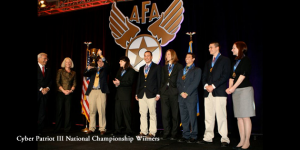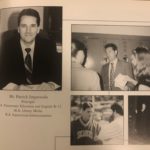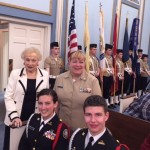Red Bank Regional Students Excel In Applied Technology
RBR Students Win the Air Force Association’s CyberPatriot III National Championship

Photo credit, Red Bank Regional High School
Little Silver: A team of six students from Red Bank Regional High School’s Academy of Information Technology out-performed 11 other teams from across the nation to win first place April 2nd in the nation’s largest and most prestigious high school cyber defense competition.
The CyberPatriot III National Championship is co-sponsored by government, non-profit and commercial sources under the direction of the non-profit Air Force Association (AFA), whose mission is to promote an understanding of cyber defense and its importance to our national security.
The RBR team was the only team from the entire Northeast region of the United States to have qualified to the championship finals, which were held in Washington, D.C. during a two-day program. The winning RBR team—nicknamed Team Mantrap, after an industrial term in cyber security lingo—includes Chris Barry of Bradley Beach; Jared Katzman of Little Silver; Adam Cotenoff, Josh Eddy, Jack Kelleher, and Colin Mahns of Shrewsbury. As finalists in the competition, Team Mantrap had already beat approximately 174 other teams from across the country.
In addition to bringing home The President’s Trophy, each of the winning students received a $2000 college scholarship from Northrop Grumman, the main sponsor of the final competition. Five of the team members will graduate high school in June, and all intend to pursue careers in cyber security. As their RBR teacher and advisor Mandy Galante says, the CyberPatriot Championship opened many new doors to these students.
“It means scholarship monies, eligibility for Honors Scholar status at their universities, prospects for job internships, and most of all, networking with industry leaders. It means a future for my students where their talents will be recognized and nurtured so that they can join the ranks of cyber leaders of their generation,” says Mrs. Galante.
The first wave of that recognition hit immediately after the competition, when the winners were announced at a celebration banquet attended by corporate executives, defense contractors and government officials, all of whom were vying to speak with members of Team Mantrap. Included among the cyber industry experts was Dr. Vincent Cerf, one of the founders of the Internet, a guest speaker at the program’s symposium—and a quasi-deity to computer wonks around the world.
The RBR students are still ebullient from their victory, but not necessarily surprised that they won. “We worked well as a team, and spent many hours preparing for it,” explains Adam Cotenoff. “I knew from the way our guys were working and the points that were registered on the board that we were ahead.”
They nearly drove their advisor out of her mind, when they started packing up their notes ten minutes before the actual end of the competition. “It’s cool,” they said to her, when they saw the panic on her face. “We did fine.”
The competition took place over a five-hour stretch in a large room where each team was ensconced in its own makeshift section. A scoreboard listed each team’s progress as the challenge evolved, but the identity of the teams was kept anonymous, so no one knew which team was actually in the lead. Throughout the competition, most of the teams’ scores tracked closely together, except for the still-anonymous winning team, which maintained a clear distance ahead of the others. Team Mantrap didn’t know it, but it was actually way ahead.
Adam Cotenoff had discovered the CyberPatriot III Competition early in the school year and asked Mrs. Galante if it might be something they could look into. The elimination process began six months ago with 186 teams registered from around the United States. Applicants included public, private and high technology focused high schools. The three qualifying competitions took place at the teams’ own high schools during all-day weekend sessions. The schools’ computers were tied into the AFA server, which provided software for the competition and real-time scoring, as students successfully identified and eliminated cyber threats against their computers within a specified time-frame. The resulting twelve national finalists were invited to the final event, with all expenses paid by the AFA sponsors.
As Team Captain Jack Kelleher comments, “Originally, Team Mantrap got involved because it sounded really cool and because we would always rather do hands-on applications of the stuff we learn in textbooks. As time went on we got better and better, we started to think, ‘Hey we could win this thing!’ Just like a sports team, we reviewed our last game to find areas for improvement. We documented game plans, and we did drills over and over again.”
The students had also recently been interviewed by German Public Radio while they competed in another competition. The German radio reporter was interested in showcasing the school’s program since cyber security has become a national priority for all industrialized nations.
In addition to her students’ hard work and preparation, Mrs. Galante believes Team Mantrap had beneficial advantages. RBR offers a very unique computer curriculum that is not available in many other schools. Students take specific courses which lead to certification in computer networking and computer security. The latter is directly applicable to the CyberPatriot III competition. They also had the guidance and mentorship of Herb Kelsey, an RBR parent who, at one point in his career, was the head of cyber security for IBM.
Mr. Kelsey commented, “Five years ago the government set out to see how they could get our young people involved in an industry that was rapidly becoming a national security priority. This competition is an outgrowth of that concern.”
Mrs. Galante agreed that there was a deeper meaning to the CyberPatriot event.
She explains, “At one point during the symposium, I heard General Lord, CIO US Air Force, speak about identifying the young people who will hold the tip of the spear in cyber defense for our nation. These students are not just geeks, with left-brains perfectly developed to speak code and manipulate bits. These young men and women are the ones who when they see a challenge, they will rise to meet it. When presented with a problem, they will strive to solve it. And when they hear a call to duty, they will answer it. These are the young men and women who will hold that cyber spear to keep our systems resilient, reliable and robust.”










